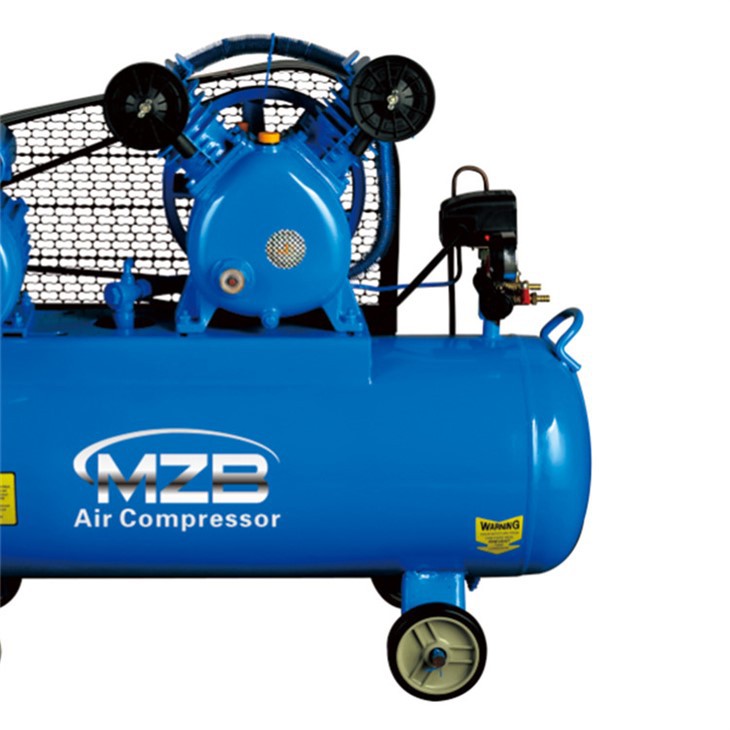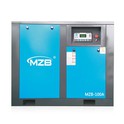As a supplier of C Type Piston Air Compressors, I've witnessed firsthand the significant influence that humidity can have on the performance and longevity of these essential industrial machines. In this blog post, I'll delve into the various impacts of humidity on C Type Piston Air Compressors, drawing on my years of experience in the industry.
Understanding the Basics of C Type Piston Air Compressors
Before we explore the effects of humidity, it's crucial to understand what a C Type Piston Air Compressor is. These compressors operate by using a piston within a cylinder to compress air. The compressed air is then stored in a tank for later use in various applications, such as powering pneumatic tools, operating machinery, and providing clean air for industrial processes.
The Impact of Humidity on Compressor Performance
1. Reduced Efficiency
Humidity can significantly reduce the efficiency of a C Type Piston Air Compressor. When the air contains a high level of moisture, the compressor has to work harder to compress the air. This is because water vapor is a gas that takes up space, and the compressor must compress both the air and the water vapor. As a result, the compressor consumes more energy to achieve the same level of compression, leading to increased operating costs.
For example, in a high - humidity environment, a compressor that would normally operate at 80% efficiency might see its efficiency drop to 70% or even lower. This decrease in efficiency not only affects the bottom line but also puts additional stress on the compressor components, potentially leading to premature wear and tear.
2. Corrosion and Rust
One of the most detrimental effects of humidity on C Type Piston Air Compressors is corrosion and rust. Water vapor in the compressed air can condense inside the compressor's components, such as the cylinder, valves, and pipes. Over time, this moisture can cause corrosion and rust, which can weaken the structural integrity of these parts.
Corroded valves may not seal properly, leading to air leaks and reduced compression efficiency. Rust on the cylinder walls can cause increased friction, which not only reduces the compressor's performance but also increases the risk of piston damage. In severe cases, corrosion and rust can lead to complete component failure, requiring expensive repairs or replacements.
3. Contamination of Compressed Air
Humidity can also lead to the contamination of compressed air. When water vapor condenses in the compressor, it can carry contaminants such as dust, dirt, and microorganisms. These contaminants can then be carried along with the compressed air into the pneumatic tools or industrial processes that rely on the compressed air.
Contaminated compressed air can cause problems in downstream applications. For instance, in a painting process, water droplets in the compressed air can cause uneven paint finishes. In a food processing plant, contaminated compressed air can pose a risk to food safety. To prevent these issues, additional filtration and drying equipment may be required, adding to the overall cost of the compressed air system.
Effects on Lubrication
1. Breakdown of Lubricating Oil
Most C Type Piston Air Compressors use lubricating oil to reduce friction between moving parts and to seal the compression chamber. However, humidity can cause the lubricating oil to break down more quickly. Water in the oil can react with the oil additives, reducing their effectiveness and causing the oil to lose its lubricating properties.
When the lubricating oil breaks down, the friction between moving parts increases, leading to increased wear and tear. This can result in reduced compressor life and more frequent maintenance requirements. Additionally, the breakdown of the lubricating oil can also lead to the formation of sludge and deposits inside the compressor, which can further impede its performance.
2. Foaming of Lubricating Oil
Another issue related to humidity and lubrication is the foaming of the lubricating oil. Water in the oil can cause it to foam, which reduces the oil's ability to lubricate effectively. Foaming can also lead to air entrainment in the oil, which can cause cavitation in the compressor's components. Cavitation is the formation and collapse of vapor bubbles in a liquid, and it can cause significant damage to the compressor's internal parts.
Strategies to Mitigate the Impact of Humidity
1. Installing Air Dryers
One of the most effective ways to combat the effects of humidity on C Type Piston Air Compressors is to install air dryers. There are several types of air dryers available, including refrigerated dryers, desiccant dryers, and membrane dryers.
Refrigerated dryers work by cooling the compressed air to a temperature where the water vapor condenses, and the condensed water is then removed. Desiccant dryers use a desiccant material to absorb the water vapor from the compressed air. Membrane dryers separate the water vapor from the air using a semi - permeable membrane.
By removing the water vapor from the compressed air, air dryers can significantly reduce the risk of corrosion, contamination, and lubrication problems. They also help to improve the efficiency of the compressor by reducing the amount of water that needs to be compressed.


2. Regular Maintenance and Inspection
Regular maintenance and inspection are essential to ensure the proper functioning of C Type Piston Air Compressors in high - humidity environments. This includes checking for signs of corrosion, rust, and air leaks, as well as monitoring the condition of the lubricating oil.
During maintenance, the compressor's filters should be replaced regularly to prevent the buildup of contaminants. The lubricating oil should be changed at the recommended intervals, and the oil level should be checked frequently. Additionally, the condensate drains should be inspected and cleaned to ensure that they are functioning properly and removing the condensed water from the system.
3. Proper Ventilation
Proper ventilation in the compressor room can also help to reduce the impact of humidity. Good ventilation helps to remove the warm, humid air from the room and replace it with fresh, dry air. This can prevent the buildup of humidity inside the compressor room and reduce the risk of condensation inside the compressor.
Case Studies
1. A Manufacturing Plant in a Coastal Area
A manufacturing plant located in a coastal area with high humidity was experiencing frequent compressor breakdowns and poor compressed air quality. The plant was using a C Type Piston Air Compressor to power its pneumatic tools and machinery. The plant noticed that the compressors were consuming more energy than usual, and the compressed air was often contaminated with water droplets.
After conducting an assessment, it was found that the high humidity was causing corrosion in the compressor components and contamination of the compressed air. The plant installed a refrigerated air dryer and implemented a regular maintenance schedule. As a result, the compressor's efficiency improved, the frequency of breakdowns decreased, and the quality of the compressed air improved significantly.
2. A Small Workshop in a Humid Climate
A small workshop in a humid climate was using a C Type Piston Air Compressor for its painting operations. The workshop was experiencing problems with uneven paint finishes due to water droplets in the compressed air. The compressor was also showing signs of corrosion and reduced performance.
The workshop installed a desiccant air dryer and started using a high - quality lubricating oil that was more resistant to water contamination. These measures helped to solve the problems with the compressed air quality and improved the overall performance of the compressor.
Conclusion
In conclusion, humidity can have a profound impact on C Type Piston Air Compressors. From reduced efficiency and increased energy consumption to corrosion, contamination, and lubrication problems, the effects of humidity can be costly and disruptive. However, by understanding these impacts and implementing appropriate mitigation strategies such as air drying, regular maintenance, and proper ventilation, the negative effects of humidity can be minimized.
If you're in the market for a reliable C Type Piston Air Compressor or need advice on how to deal with humidity - related issues in your compressed air system, I encourage you to reach out. We have a team of experts who can provide you with the right solutions for your specific needs. Whether you're looking for a new compressor or need help optimizing your existing system, we're here to assist you. Contact us today to start a discussion about your compressed air requirements.
References
- Compressed Air and Gas Institute (CAGI). “Best Practices for Compressed Air Systems in Humid Environments.”
- Handbook of Compressed Air Systems, Third Edition. McGraw - Hill.
- “The Impact of Environmental Factors on Compressor Performance” - Industrial Machinery Journal.






